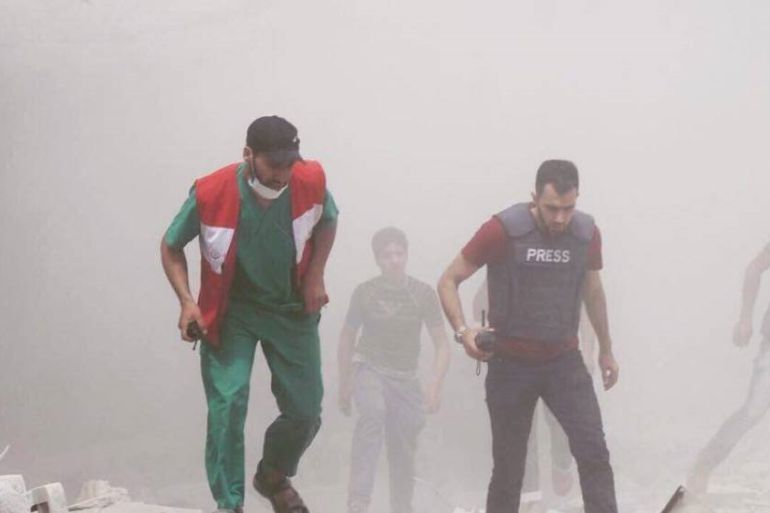Hadi al-Abdallah: The man documenting Syria’s Civil War
Syrian activist and journalist tells Al Jazeera what life is like in and around Aleppo after the truce.

Aleppo, Syria – A figure is running through a cloud of smoke and brick-dust, his panting audible through the camera just keeping up behind him. Sirens are heard. Pillars of smoke rise up from behind residential buildings. Another air strike.
Hadi al-Abdullah, a prominent Syrian journalist and activist, has been documenting the devastation left behind by Syrian and Russian air strikes on Aleppo, since a major flare-up in fighting weeks ago.
Since the outbreak of the uprising, Abdullah has made a name for himself – first, as an anti-regime activist in his home city of Homs, and later as a citizen journalist working in fraught, often incredibly dangerous conditions on some of Syria’s major battlefields: Qusayr, Idlib and now Aleppo.
Abdullah has made himself unpopular with both the Syrian government and al-Nusra Front, which detained him and another prominent Syrian activist, Raed Fares, in Kafranbel earlier this year.
Abdullah’s recent videos have shown air strikes falling on neighbourhoods in the east of Aleppo, as well as the devastation they cause: Bombed-out homes and market-places, children caught up in the violence.
Al Jazeera speaks to Abdullah to find out more about the situation on the ground in Aleppo after the ceasefire.
READ MORE: Syria’s Civil war Explained
Al Jazeera: In recent weeks, international media has focused on the escalating situation in Aleppo. What have you seen so far?
|
I’ve seen civilians under the rubble of destroyed buildings; a father looking for his children under the rubble, a mother searching for her kids. The situation is very difficult. |
Hadi Abdullah: I’ve been filming everything in Aleppo since the beginning of the military campaign launched by the Syrian and Russian air forces. I have documented many massacres committed by both forces including the one in Al-Quds hospital, the hospital run by Doctors Without Borders.
However, since the beginning of the ceasefire, the situation in Aleppo has become quieter. The city isn’t being exposed to intense bombing in the way it was before. There are still ceasefire violations by the regime every day, mainly bombing from artillery, but it’s quieter than before.
But, we have to distinguish between Aleppo and the countryside. The Aleppo countryside never went through any truce or ceasefire, either from the side of the rebels or the regime forces, so fighting is still going on there.
Al Jazeera: And what’s the situation south of Aleppo?
Abdullah: When civilians were being bombed in the city, there was pressure on the Free Syrian Army (FSA) and Islamic factions to open up a front with the regime so that civilians wouldn’t be bombed any more.
Many believed that if a new front opened up, the Russian and Syrian air forces would strike there, and the bombing on civilians would stop. So, Jaish al-Fateh [a rebel coalition that includes a number of Islamist factions including al-Nusra Front] took the town of Khan Touman, and then the town of Khaldiya, from regime forces, as well as a series of hills close by.
I went there [earlier this month] to cover the military operations. Since then, the fighting hasn’t calmed down.
The bombing is not only over Khan Touman, but over all the western and southern areas in the Aleppo countryside. There, the bombing never stops.
Al Jazeera: How are civilians in rebel-held Aleppo faring since the ceasefire came in?
Abdullah: Civilians are beginning to restore their normal life, and the marketplaces are becoming busier, bit-by-bit. Some of the electricity cables that were cut during the last two weeks of military campaigns are being repaired. The streets are being cleared of rubble. But people are still afraid that the regime may carry out more ceasefire violations.
!['I've been filming everything in Aleppo since the beginning of the military campaign launched by the Syrian and Russian air forces,' says Abdallah [Courtesy of Hadi al-Abdallah/Al Jazeera]](/wp-content/uploads/2016/05/819340507a9e49e6996a1048ca85f5e8_18.jpeg)
|
|
Al Jazeera: Who are the main rebel groups now in Aleppo?
Abdullah: Most of the brigades in Aleppo belong to the Free Syrian Army – groups like Jabhat al-Sham (al-Sham Front), the Nour al-Din al-Zinki Movement as well as the Mujahideen Army. Those are the most prominent groups, although there are some Islamist factions from Ahrar al-Sham, Jaish al-Islam and so on, however, it’s mainly FSA forces.
Al Jazeera: At the same time, there’s been some debate on whether or not al-Nusra Front maintains a presence in Aleppo – something the Russians and Syrians have used to justify recent air strikes on urban areas.
Abdullah: Al-Nusra is rarely seen inside Aleppo. There are some individuals from al-Nusra who hail originally from Aleppo and live inside the city, but there’s no headquarters for al-Nusra and they don’t have a significant presence inside Aleppo. They exist more as part of Jaish al-Fateh in the countryside to the south. As I said, the main presence in the city is the FSA.
Al Jazeera: In some of your recent videos, you’re reporting in neighbourhoods of Aleppo while air strikes are falling nearby. What’s it actually like to report in those sorts of conditions?
Abdullah: You’re in a neighbourhood and it might be attacked by rockets from aircraft, barrel bombs or shells. I’ve seen civilians under the rubble of destroyed buildings; a father looking for his children under the rubble, a mother searching for her kids. The situation is very difficult.
Al Jazeera: What hopes do you have for the short-term truce?
Abdullah: Right now, I can hear military aircraft flying over Aleppo. That’s just proof of how fragile the ceasefire is. I’m not hopeful at all.
Nahla Nemr contributed to reporting